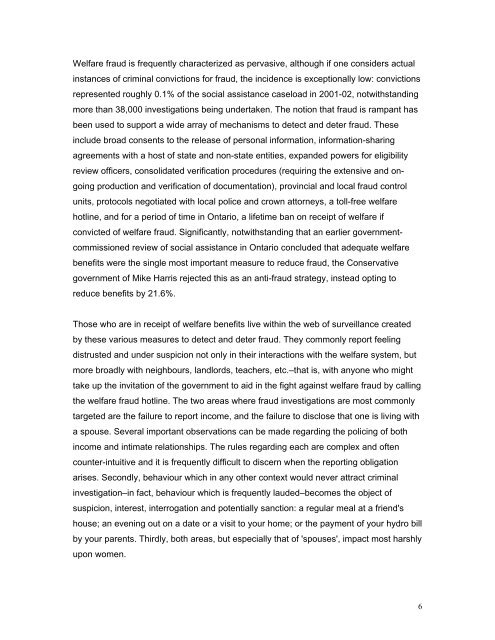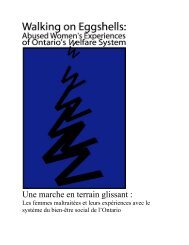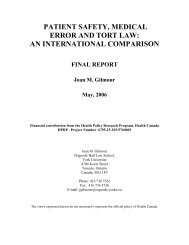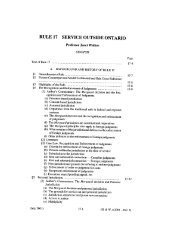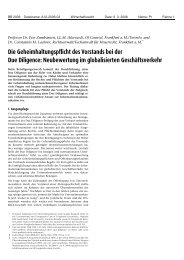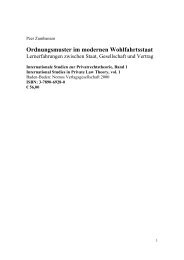Welfare Fraud: The Constitution of Social ... - York University
Welfare Fraud: The Constitution of Social ... - York University
Welfare Fraud: The Constitution of Social ... - York University
You also want an ePaper? Increase the reach of your titles
YUMPU automatically turns print PDFs into web optimized ePapers that Google loves.
<strong>Welfare</strong> fraud is frequently characterized as pervasive, although if one considers actual<br />
instances <strong>of</strong> criminal convictions for fraud, the incidence is exceptionally low: convictions<br />
represented roughly 0.1% <strong>of</strong> the social assistance caseload in 2001-02, notwithstanding<br />
more than 38,000 investigations being undertaken. <strong>The</strong> notion that fraud is rampant has<br />
been used to support a wide array <strong>of</strong> mechanisms to detect and deter fraud. <strong>The</strong>se<br />
include broad consents to the release <strong>of</strong> personal information, information-sharing<br />
agreements with a host <strong>of</strong> state and non-state entities, expanded powers for eligibility<br />
review <strong>of</strong>ficers, consolidated verification procedures (requiring the extensive and ongoing<br />
production and verification <strong>of</strong> documentation), provincial and local fraud control<br />
units, protocols negotiated with local police and crown attorneys, a toll-free welfare<br />
hotline, and for a period <strong>of</strong> time in Ontario, a lifetime ban on receipt <strong>of</strong> welfare if<br />
convicted <strong>of</strong> welfare fraud. Significantly, notwithstanding that an earlier governmentcommissioned<br />
review <strong>of</strong> social assistance in Ontario concluded that adequate welfare<br />
benefits were the single most important measure to reduce fraud, the Conservative<br />
government <strong>of</strong> Mike Harris rejected this as an anti-fraud strategy, instead opting to<br />
reduce benefits by 21.6%.<br />
Those who are in receipt <strong>of</strong> welfare benefits live within the web <strong>of</strong> surveillance created<br />
by these various measures to detect and deter fraud. <strong>The</strong>y commonly report feeling<br />
distrusted and under suspicion not only in their interactions with the welfare system, but<br />
more broadly with neighbours, landlords, teachers, etc.–that is, with anyone who might<br />
take up the invitation <strong>of</strong> the government to aid in the fight against welfare fraud by calling<br />
the welfare fraud hotline. <strong>The</strong> two areas where fraud investigations are most commonly<br />
targeted are the failure to report income, and the failure to disclose that one is living with<br />
a spouse. Several important observations can be made regarding the policing <strong>of</strong> both<br />
income and intimate relationships. <strong>The</strong> rules regarding each are complex and <strong>of</strong>ten<br />
counter-intuitive and it is frequently difficult to discern when the reporting obligation<br />
arises. Secondly, behaviour which in any other context would never attract criminal<br />
investigation–in fact, behaviour which is frequently lauded–becomes the object <strong>of</strong><br />
suspicion, interest, interrogation and potentially sanction: a regular meal at a friend's<br />
house; an evening out on a date or a visit to your home; or the payment <strong>of</strong> your hydro bill<br />
by your parents. Thirdly, both areas, but especially that <strong>of</strong> 'spouses', impact most harshly<br />
upon women.<br />
6


